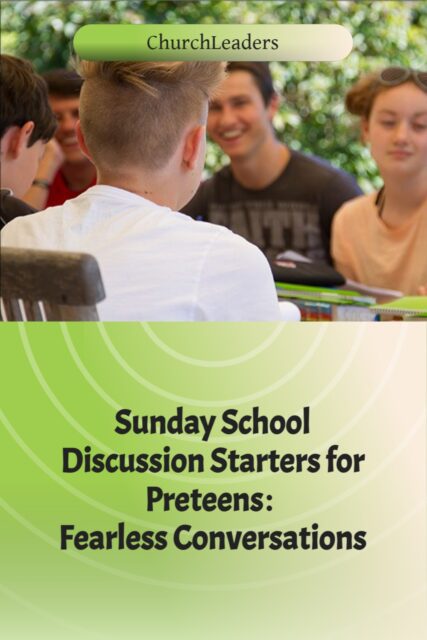Need effective Sunday school discussion topics to use with preteens? Want to engage in fearless conversations with middle schoolers and junior highers? Then use these insights to spark meaningful discussions with older kids.
Don’t run from uncomfortable topics with preteens. Kids need you to set everything aside and engage in fearless conversation. A great way to do that is with Sunday school discussion topics.
- “If God is on our side, why did my friend’s mom die? My friend says if there was a God, he wouldn’t have let this happen.”
- “If God loves me so much, how come the kids at school hate me?”
- “I don’t want my body to change. It feels like everyone’s looking at me.”
- “I don’t feel normal.”
- “Why do my friends act one way to my face but then talk about me when I’m not around?”
- “Bad things are happening everywhere to kids, and I’m scared something bad will happen to me. Why doesn’t God protect kids?”
If you can relate to any of these questions, you likely spend time with preteens. You also may have felt overwhelmed or stumped by their questions and been tempted to find a quick escape.
Preteens’ brains and bodies are undergoing significant developmental change. This is an often-bumpy shift for kids. During this life stage, kids emotionally and physically begin moving from childhood into adolescence. The phase is fraught with emotions, doubts, and problems. That’s why it’s also a crucial time to be ready, willing, and able to engage in fearless conversation with kids.
What Preteens Face
Here are some changes preteens experience:
- Their reasoning abilities are sharpening and developing rapidly. Preteens begin to see the world around them more clearly. They also gain a deeper understanding of events happening outside their immediate world.
- Preteens are especially adept at learning new skills. It’s a great time to let them explore interests and try new, positive experiences.
- While younger children move from concrete to abstract thinking as their brains develop, preteens move to more complex abstract thinking and reasoning. As a result, preteens begin to interpret, compare, and judge what adults say—sometimes finding it lacking when considered alongside their personal desires. Adults may view this preteen pushback as sass or attitude.
- Preteens are heading for independence. They begin to pull away from adult hovering and strive to prove their ability—often before they’re ready. When preteens feel they’re being treated like “babies,” they’ll rebel and ignore the adults who do it.
- Friendships take on ever-deeper importance, especially for girls. Preteens are not as reliant on their parents, and friends often slide into place as the relationships they’re most attentive to.
- Typically, boys’ and girls’ behavior patterns diverge further apart. Girls tend to become more focused on complex interpersonal relationships. Boys’ focus tends to turn to activities—regardless of who’s participating.
- For preteens, the internet is their domain. It’s their private world where things can go well—or horribly—depending on social media interaction that particular day.


